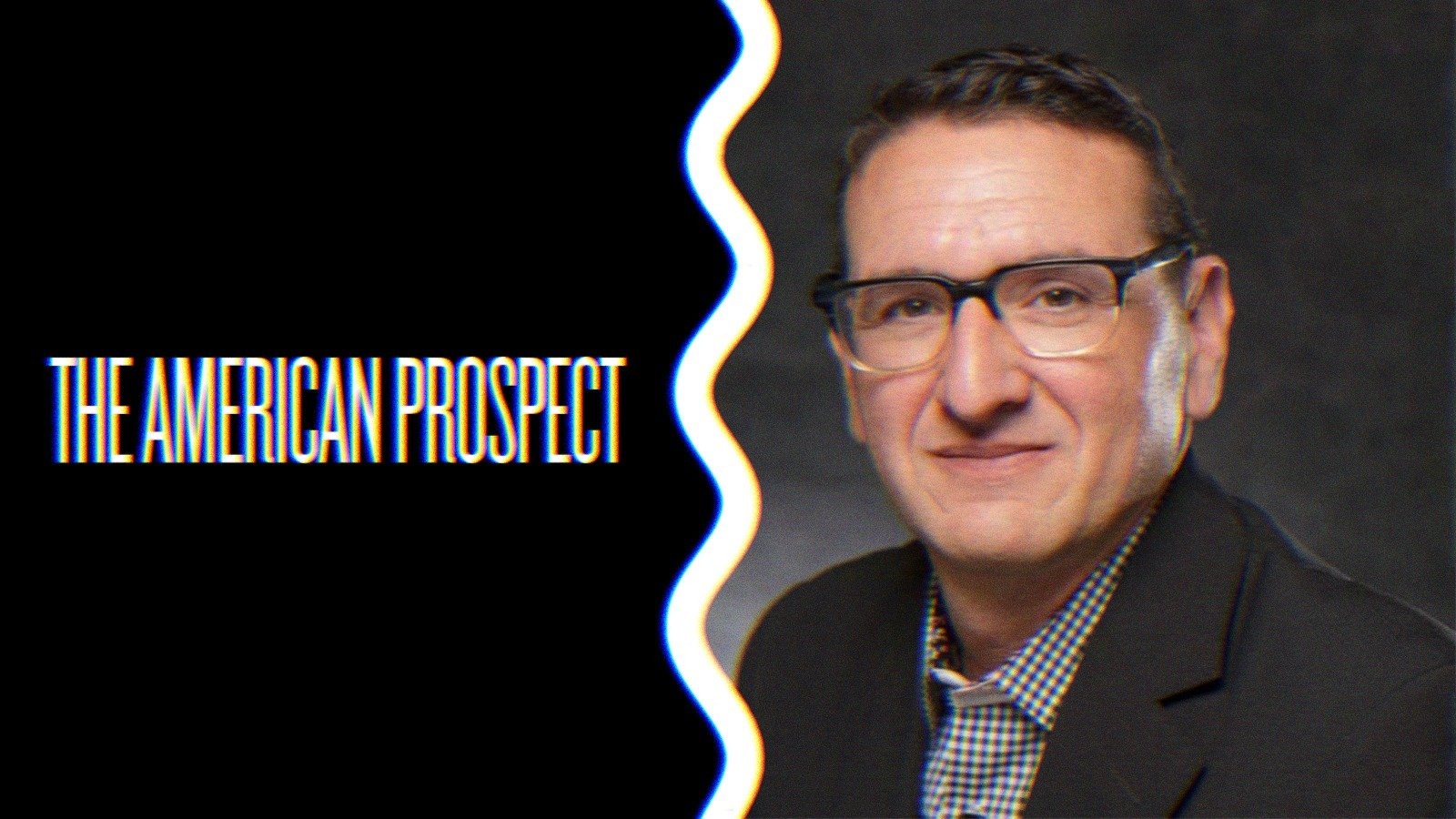Progressive Spotlight: David Dayen.
Speaking Truth to Power & Calling Out Monopolies, Inequality & Bad Policy.
 Image Description: The American Prospect logo alongside a photo of David Dayen.
Image Description: The American Prospect logo alongside a photo of David Dayen.
Author, journalist, activist, recovering comic—David Dayen has dedicated much of his life to exposing the vicious truths about unregulated corporate greed, unchecked political power, out-of-control monopolism, and pretty much anything else destined to destroy democracy and crush the people who believe in its promise.
As executive editor of The American Prospect (TAP), he challenges these threats on the daily—guiding its team of journalists and editors in their collective quest to correct false narratives, defend civil liberties, and address the many machinations of the elite power structure lording over our republic and manipulating the levers of government and corporate governance toward their own ends rather than the constituents, consumers, and public they allegedly serve.
This mission courses through the syllables of his two books—roadmaps of the infinite ways consolidated power and egregious disregard for the everyday person corrupts and devastates, complete with potential solutions for how it might be reined in.
Dayen is a prominent voice and thought leader in the anti-monopoly movement. Speaking out about the dangers of monopolies and their detrimental impacts on society—from deepening inequalities and minimizing consumer choice to suppressing wages and propagating sub-par working conditions—is his jam. So is providing important context.
His 2020 book, “Monopolized: Life in the Age of Corporate Power,” chronicles how just a handful of now-ubiquitous mega-companies affect and ultimately control even the most seemingly mundane aspects of American life.
It begins with what sounds like a joke—though as you soon come to realize, the real joke’s on all of us. It’s a sobering reality.
“On April 15, 2019, Salesforce.com announced a $300 million deal to buy Salesforce.org,” it reads. “We’re living in an age where companies buying themselves offers the only respite from companies buying each other. It sounds absurd, but our era is absurd.
“The capitalist economic system, whether you value it or not, relies on competition,” it continues. “At its best, competition keeps companies honest, narrows costs, expands the job base, sows innovation, distributes the fruits of productivity widely, and gives every member of society a chance to use their talents to earn a living. Competition protects economies, affords possibility, and allows democracy to flourish, as no one firm becomes big enough to control the corridors of power. That’s the theory, at least, and historical evidence bears it out. America’s best moments of shared prosperity line up favorably with eras of robust competition, when government-appointed guardians attacked efforts to corner markets.”
Dayen’s 2016 release “Chain of Title: How Three Ordinary Americans Uncovered Wall Street’s Great Foreclosure Fraud” earned the Ida and Studs Terkel Prize from The New Press. He was awarded the 2021 Hillman Prize in Magazine Journalism for his daily coronavirus pandemic report, “Unsanitized.”
Rashed Mian and I interviewed Dayen for our 2023 News Beat podcast episode “Secrecy, Deceit & Distractions: Inside Amazon & Google’s Antitrust Wars.” Here’s a snippet of his analysis of the tougher antitrust posture taken by former Federal Trade Commission (FTC) Chair Lina Khan and former Assistant Attorney General Jonathan Kanter:
“I think that there has been an absolute change in the way that antitrust enforcement is conducted,” he says. “There have been mergers that have been blocked. There have been other cases that had been brought. And I think the proof of the success of this, in my view, is the fact that merger activity is at a 10-year low. So companies out there know, if we’re going to try to merge and monopolize markets, we’re going to have some friction, we’re going to have some trouble getting this past the FTC or the Justice Department’s Antitrust Division. And so that creates a deterrent in of itself. And I think, ultimately, that’s good for competition.”
While whether or not the agencies continue on that path remains an open question, what’s crystal clear is that it’s a completely different universe now since Joe Biden’s ousting and the new regime assumed control (understatement of the century)—providing Dayen with plenty more equally pressing issues to tackle in tandem with immensely consequential monopolistic mergers.
Here’s part of his recent take on the economic impact of the Trump administration’s ongoing immigration crackdown:
“The absurd yet dangerous removal of the commissioner of the Bureau of Labor Statistics for the offense of reporting jobs figures as they are collected has overshadowed the reasons why U.S. employment is struggling,” he writes. “There’s the argument that tariff uncertainty has finally caught up to the real economy, and the argument that the country only produces AI data centers and sick people for the health care system to manage. But one important issue has been pushed off to the side: the predictable economic impact of ICE’s terror campaign against immigrant communities.”
Now in his fifties, Dayen wasn’t always a political/economic/social gadfly—though he’s always enjoyed humor and performed stand-up comedy well into his thirties, editing video for reality shows and documentaries to pay the bills, he told Columbia Journalism Review in 2022. He started a blog in 2004, and was a fan of left-leaning comic strip This Modern World, which led him to progressive news site Daily Kos, which he cross-posted his articles, and which ultimately sparked his involvement in the online progressive activism Netroots movement.
From 2009 to 2012 Dayen wrote for progressive blog FireDogLake and subsequently freelanced for The Intercept, The New Republic, and TAP, among other outlets, according to the CJR article. (Unimportant factoid: Rashed and I visited FDL headquarters for a different story we were covering in 2013.)
In 2018, he was approached by TAP’s founders to take over the reins.
Based in Washington, D.C., The American Prospect is currently celebrating its 35th year, and recognized as a leading independent outlet for progressive ideas, perspectives, and analysis. A reader-funded nonprofit published daily online and bimonthly in a print magazine, it prides itself in amplifying marginalized voices otherwise snuffed out by mainstream media and demonized by the right. Dayen took the helm in 2019, and among other changes and improvements, increased its printing frequency, adopted the tagline “Ideas, Politics & Power,” boosted its readership and visibility, and expanded its internship and writing fellowship programs. Those have served as incubators for journalists who’ve gone on to success across the industry, including Ezra Klein, Nicholas Confessore, Dana Goldstein, Jamelle Bouie, among many others.
Nowadays, when he’s not shepherding and writing articles for TAP (which he does constantly), he takes the progressive and antitrust message to the airwaves of his own pod “Organized Money” and accompanying Substack newsletter, which he launched last year with Matt Stoller, research director at the nonprofit American Economic Liberties Project.
Each week, they “break down the ways monopolies control everything from the food we eat, to the drugs we take, the way we communicate and even how we date,” reads its Apple Podcasts description. Guests include antitrust lawyers, workers, business leaders, and policymakers “on the front lines of the fight for open markets and fair competition.”
I sampled a few, and they’ve definitely got a gift for making topics I’d imagine some might consider too complex or confusing—exciting, intriguing, immediate. They unpack them with care, thoughtfulness, and compassion.
As with Dayen’s other work, such issues demand as much.
In comedy, as in so many other facets of life, including journalism, timing is everything. Deliver a punchline too early and the audience will be like Wtf? Publish a story too late and they also be like Wtf? You also need to read the room and do your best to understand your audience, get the vibe: who they are, what might strike a chord with them, get them to react, move them, enrage them, disturb them, make them laugh, cry, protest, demand better.
As steward of TAP, David Dayen produces, oversees, and delivers important stories that do all of the above, at a time when the stakes could not be higher—for the free press, for the economy, for the world—and the public is fiending for some truth.
So while cold, hard news is certainly no laughing matter, perhaps his stint in stand-up comedy paid off, after all.
Image Source
- Logo and headshot courtesy of The American Prospect.
Christopher Twarowski is editor in chief of award-winning social justice podcast News Beat and co-founder of Substack newsletter Free The Press (FTP). He has also written for the financial and metro desks of The Washington Post. He strives to shine a light on under-reported issues and communities and spark positive change.


